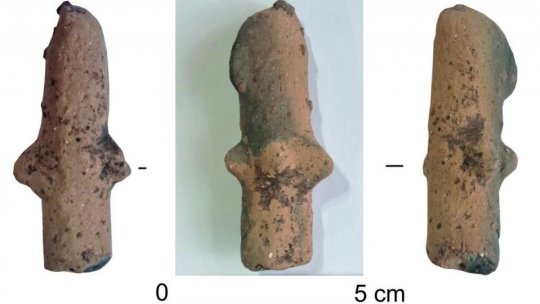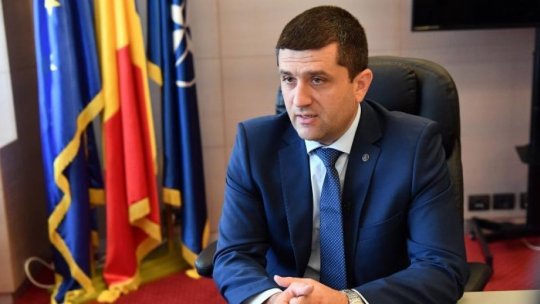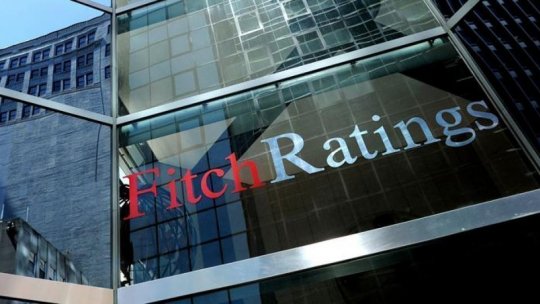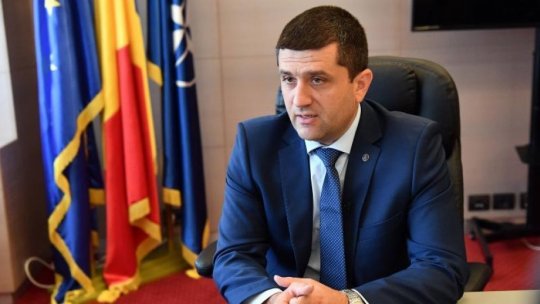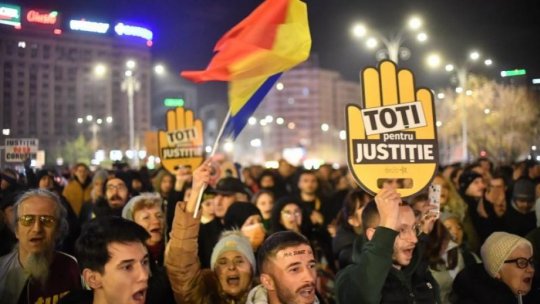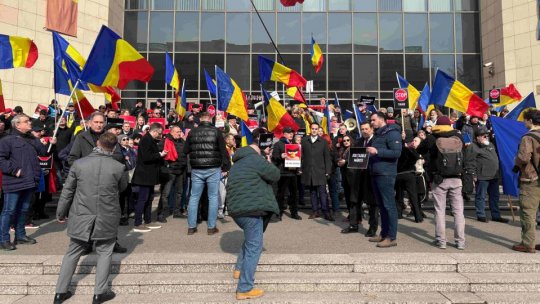PESCO, NATO and Euro-Atlantic Security
PESCO efforts to strengthen European Defense are complementary to co-operation with NATO.
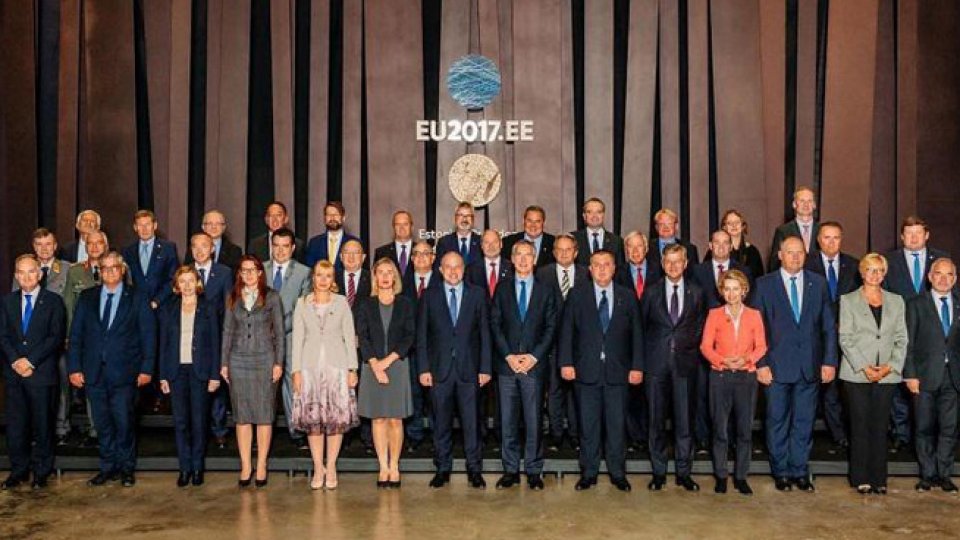
Articol de Radu Dobriţoiu, 06 Noiembrie 2017, 22:45
Efforts to strengthen European Defense come to the fore not only from a political point of view, but also from an institutional point of view. These days, European Defense needs a complex strategy, considering the violent conflicts in the nearby, the exposure to cyber terrorism and to the hybrid war and the threats coming from foreign fighters, an overlapping of internal security issues with those coming from the outside.
Efforts made by the EU Structured Defense Permanent Cooperation (PESCO) to strengthen the integration of European Defense are complementary to cooperation with NATO. In fact, 22 of the 28 EU Member States are also part of NATO. On the other hand, PESCO can significantly strengthen the European component of NATO and can also ensure that the two organizations can cooperate to ensure collective security.
RRA Military Reporter Radu Dobriţoiu interviewed Gen. lt. (ret.) Alexandru GRUMAZ, Political Military Analyst, a special guest of Radio Romania News, for the “PESCO, NATO and Euro-Atlantic Security” Radio-Show(excerpts):
Radu Dobriţoiu: General, an ambitious initiative for the Structured Defense Permanent Cooperation. EU High Representative for Foreign Affairs and Security Policy, Ms.Federica Mogherini, said that PESCO will be launched within the European Union by the end of December this year, a short term, taking into account the fact that this initiative has been shaped this year.
Alexandru Grumaz: Yes, the geopolitical situation in Europe requires this, given that we have conflicts in the Eastern part of Europe as well as in the Southern Europe. We have migration, we have problems because of cyber attacks coming from Asia, all over Asia, East Asia and ...
Radu Dobriţoiu: And from Russia.
Alexandru Grumaz: ... from Russia. In fact, President Klaus Iohannis said that these issues related to Structural Defense Cooperation do not conflict with NATO. I will take another approach to this issue, because we are in Europe and we are talking about European security, I will start with what Macron has promised. The new President of France has pledged to support and defend the European Union right from his first visit abroad, to Berlin, where he met with Chancellor Angela Merkel. There, they talked about a European Union Defense Fund and I also think of what NATO Secretary General, Jens Stoltenberg, recently said in Bucharest, at the Parliamentary Assembly of the Alliance, that we, Europeans, especially those from NATO, the Allies, must keep our technological advance, and this Fund is meant precisely to keep this technological advance.
Radu Dobriţoiu: The advance is first of all toward Russia, General.
Alexandru Grumaz: Russia, exactly, because if we look at what has happened over the last few months, I will only give one example: Zapad exercise 2017 ...
Radu Dobriţoiu: ... which was originally announced as an exercise with Russia's 12,000-13,000 soldiers and NATO information primarily based on screening, surveillance, including drones or satellites have revealed that there were 100,000 soldiers. The exercise did not last five days, but two months, and of course the scale was much higher than what Russia had announced, including at the OSCE.
Alexandru Grumaz: I am referring to a particular aspect of this exercise, namely, the use of electronic warfare. The Russians used this against the Swedish Öland Islands, they wanted to block communications in that area, and managed to block communications in Norway and Sweden, some in Sweden and the Baltic countries. So this communication jamming exercise shows that the Russians are very well prepared from the point of view of the electronic warfare. Lt.Gen Ben Hodges (Commanding General of the U.S.Army Europe, n.a.) said: "Russia has developed very sophisticated electronic warfare systems, while NATO has been targeting counterterrorism operations. Many have been used in the ZAPAD exercise". So the ZAPAD exercise, along with the exercises in Syria, where the Russians used almost 165 new technical means, experienced, loaded the military panoply and complicated the situation in the rest of Europe.
Radu Dobriţoiu: Let us recall, General, that in this Russian large-scale exercise executed every two-years, there were also drills in Transnistria, in the proximity of Romania, where...
Alexandru Grumaz: It was an exercise for building bridges and pontoons and for crossing water by a brigade of armored conveyors.
Radu Dobriţoiu: And probably this advance of Russia in Crimea and towards Donbas, by occupying these regions, provides them with a rapprochement for the "Herzian cover" of this electronic warfare.
Alexandru Grumaz: Yes, in the so-called "Crimea Aircraft Carrier", they installed the Murmansk and Krasukha electronic warfare gear, which have a range of about 500 km; you do the math: it covers almost half of Romania, so 300 and some kilometers from Crimea to Constanţa and 200 km more in Romania. So the blocking of the signals passes Bucharest ...
Radu Dobriţoiu: Let's explain to the listeners what this jamming would mean...
Alexandru Grumaz: Well that means the impossibility to communicate, transmit orders, the impossibility to talk with the commanders, in the territory, you cannot contact the theaters of operations, so absolutely everything is blocked ...
Radu Dobriţoiu: And they become the masters of communications and ...
Alexandru Grumaz: Yes, they become the masters of communications and then you are unable, as a commander or at whatever stage you are, you can no longer run your own troops.(...)
Radu Dobriţoiu: Coming back to this European Defense initiative, PESCO, there are already 30 concrete projects of cooperation between the EU Member States; this was announced in September at the meeting of EU Foreign and Defense Ministers. What would be the main concrete cooperation projects?
Alexandru Grumaz: I say it's premature to talk about cooperation projects now, because things are just starting out, the financial conditions for allocating the 5 million euros for this Fund have not been established yet. I want to say something else. I was starting to talk about Macron. He supports strengthening all the EU instruments ...
Radu Dobriţoiu: A supporter of this Defense initiative.
Alexandru Grumaz: Yes, he is a supporter and not only of this; he is a supporter of projects such as the European Intervention Initiative. Keep in mind that France is currently the only representative of Europe in the Security Council, because the UK has come out, (...) and the only nuclear power in Europe (...) Macron said: "Our goal is for Europeans to have common doctrines and joint, credible intervention capacity and the needed instruments for this type of intervention" (...) France intends to participate in the development of a European Defense Industry - attention, this is very important, France has over 200,000 people currently working in the Defense Industry and (..) has high technological capabilities.
Radu Dobriţoiu: President Macron's visit to Bucharest also included talks on the Defense Industry.
Alexandru Grumaz: Yes of course. If we remember the past years, Sarkozy was extremely happy when Romania wanted to acquire the Shorad, Vshorad systems (Short Range Air Defense, n.a.), anti-aircraft defense systems at low and very low altitude, and he promised that he would support Romania to get an important chair of a European Commissioner. The whole business went off when Romania did no longer buy these systems, a press scandal broke out about the money that was awarded to this contract, and then the whole matter was closed.
The Structured Defense Permanent Cooperation, PESCO, is to be launched by the end of this year. Romania has decided to take part in this process right from the start.
RRA Reporter Oana Bâlă, from the Cotroceni Palace: President Klaus Iohannis informed members of the European Council at the last meeting in October of Romania's decision to participate in the EU’s Structured Defense Permanent Cooperation (PESCO) right from its launch scheduled for December. According to the Head of the Romanian State, efforts at the European Union level to strengthen cooperation in this area are necessary and it is in the interest of Romania to support a more consistent commitment to Security and Defense, especially in the current international context. PESCO will provide a significant opportunity for cooperation in the Defense industries, including the Romanian one, by creating a common framework for the promotion of concrete Defense projects. President of Romania emphasized the need for a pragmatic, transparent and inclusive approach to the Heads of State and Government of the EU Member States, avoiding duplication of objectives and actions within NATO. Prior to the autumn meeting of the European Council, the Head of State submitted to CSAT approval for Romania’s participation in the PESCO mechanism. Members of the Romanian Supreme Council for National Defense (CSAT) approved the participation, after analyzing its effects for Romania.
Radu Dobriţoiu: General, is this initiative an opportunity for Romania to re-develop its Defense industry, based on the experience of the past? I think of projects such as Plant „Mecanica” in Bucharest, in partnership with General Dynamics, or similar projects for the development of military technologies on Romanian territory, in partnership with European companies.
Alexandru Grumaz: This is an opportunity. Any action of this kind is an opportunity for Romania, but first of all, a great opportunity is how we negotiate programs for the endowment of the Romanian Army. And here I refer to the offset that we need to consider (...) Poland knew how to negotiate with Lockheed, the (Polish, n.a.) Government got involved, because at some point these negotiations were blocked (...) Lokheed brought other companies worth nine billion and the Poles chose six billion (...) then the Germans gave them MIG 29 with 1 euro, those from the former GDR, and then they made an acceptable fleet for the airline they were conducting, just as we did. After that, they went to another program, and here it is very important how the administration works: the Warsaw administration has given 13% of GDP for the purchase of airplanes, without entering the budget of the Polish Ministry of Defense (...) the contract was negotiated by the Government and so on. We too have made a step forward and it is good that the determination of Prime Minister Tudose led to the signing of the contract with General Dynamics. I now expect him to supervise the signing of the contract for the Dracula attack helicopters, because (...) we weren’t able to finalize the first contract (...)
Radu Dobriţoiu: Things should move a bit faster because we can say that the time passes by to the detriment of European Defense.
Alexandru Grumaz: Not only that, but the point is that current conditions and threats are different from those that were a few years ago. So, we are moving in an unstable environment, in complete uncertainty. You see, (National Security Advisor of the United States, n.a.) H.R.McMaster said at a White House conference that North Korea is not a threat to America, South Korea and Japan, it's for everyone, and that's the truth, it's a threat for everyone.
Radu Dobriţoiu: Right. President Macron is one of the supporters of PESCO, as I mentioned. Is France trying to regain the prestige it lost at some point within NATO?
Alexandru Grumaz: Yes. Trying to regain it / and Macron also uses some of de Gaulle's theories. De Gaulle said "Europe can defend itself without the help of the Americans," which did not happen, it did not happen in two World Wars, but anyway that was his idea..
The United States signals that the crossing of European borders with military techniques needs to be improved so that in crisis situations it can be swiftly used in support of the Allies.RRA Press Correspondent in the United States Doina Saiciuc: For three years, General Ben Hodges, (Commander, US Army Europe, n.a.) has urged allies to establish a military area that allows military convoys to cross national borders in peacetime. Convoys of US forces are often delayed by various customs regulations that they must obey when moving between countries. Such barriers could theoretically be lifted or ignored in time of war (...). General Hodges says: "(...) Whatever we do before activating Article 5 (of NATO Treaty, regarding collective defense, n.a.) should be done in peace conditions". US Defense Secretary Jim Mattis and military leaders from NATO countries will consider, at the ministerial meeting on 8-9 November in Brussels, structure reforms of this command, to allow a more rapid deployment of forces in Europe. The measures taken into account include the setting up of two new centers, one focusing on the provision of sea transit routes, and another, which will be responsible for protecting land-based resource lines. The Allies also adjust their national legislation to allow military equipment to transit through borders faster and work to improve national infrastructure. One of the new NATO headquarters under consideration would be located in the US and would focus on maritime challenges, being shaped after the supreme ally command from the Cold War. The second would be to lead and protect the continent's resource lines. Possible locations for this: Germany or Poland. While working on new command and control capabilities, NATO will assess infrastructure in Eastern Europe.
Radu Dobriţoiu: General Grumaz, do you think that in a real crisis situation, Europe, the European Union, can defend of Russia without the US support?
Alexandru Grumaz: No, in no case. At present, this is impossible, considering - and I give you one example - logistics. NATO is currently thinking of building a logistics headquarters on the eastern part of the continent in the eastern area, here in our area. There are many different systems. You can not provide logistics for now. The repositioning of the technique that the US have made on three types of equipment - tanks, conveyors and self-propelled cannons, Abrams, Bradley and Paladin, is extremely important. You have one type of logistics for each, you do not have to take thousands of deposits. There are 18 types of frigates, there are 12 types of tanks in Europe. There are 10 types of planes. Where do you get logistics for all this to go to the eastern flank? It is very complicated. But there is a matter that I want to mention here, and it is something that besides this military Schengen that your colleague from Washington has mentioned, it is important to know that the Black Sea has now become an extremely important center of military operations. (..) If Russia links Crimea to Syria, it can control not only the Black Sea, it also controls the Mediterranean and that is very important. And Stavridis (James Stavridis, a retired four-star U.S. Navy admiral and NATO supreme allied commander who serves today as the dean of the Fletcher School of Law and Diplomacy at Tufts University, n.a.) mentioned in a paper he conveyed to the Congress that there are four important things. One, NATO should consolidate its visit schedule in the ports of Romania, Turkey, Bulgaria and the partner harbors, Georgia and what’s left of the Ukrainian harbors; second, it has to fund a coherent plan for operations in the Black Sea ( ...) Also, increase the presence - and Stavridis spoke of the four Destroyers with Aegis technology at Rota, placed in the Mediterranean and can often participate in drills in the Black Sea for a limited period according to the Montreaux Convention. And four, it should work closely with Turkey, which currently owns the Black Sea keys, the Bosphorus and the Dardanelles.
Radu Dobriţoiu: It has had these keys for a long time, General. Will PESCO encourage this European Defense initiative, the strengthening of the relations between the United Kingdom and the US, considering that the United Kingdom will leave the European Union, but will continue to represent a strong European ally of NATO?
Alexandru Grumaz: No, I think it will remain based on bilateral relations and work within NATO. The UK was against a European army, which European Commission President Jean-Claude Juncker already mentioned in paper released in Spring. So I think the UK will remain in NATO as a partner for the allied countries in Europe and will conduct bilateral relations with other countries, as is Romania and Poland.
Radu Dobriţoiu: Will PESCO require a budget for Defense and Endowment, separate from contributions to NATO?
Alexandru Grumaz: No, no, this budget will be allocated by the European Union from EU funds, so no money will be allocated to PESCO from the national budgets.
Radu Dobriţoiu: How effective do you think this European Defense project is?
Alexandru Grumaz: It seems to me extremely important at the moment. It is a B plan for defending European security and we must always have a plan B.
Radu Dobriţoiu: There was a lot of discussion and this project was contradicted, arguing that it should rather be limited to certain areas. I am thinking of cyber defense, economic security, defense against terrorist attacks on the territory of the Member States. Do you think that this project needs to be developed in other spheres of security?
Alexandru Grumaz: Yes, I believe that the common European projects must develop because, given that they are funded by the European Union - here we are talking not only of EU funding, but we are also discussing the Treaty of Lisbon and what what we have in the Treaties, Articles 42, the Treaty on European Union, paragraph 2 and paragraph 6. So we already have this in the Treaty, and everything that is happening within the EU is based on a Treaty.
Radu Dobriţoiu: To conclude, this means that by the end of this year, this project can become a functional institution?
Alexandru Grumaz: No, for the time being is just starting to take shape. This Council of military planning and leadership capability has been created and for now it is a core of eight, nine men in the European Union military staff.
Radu Dobriţoiu: "Euroatlantica" at the end. We talked about PESCO, NATO and Euro-Atlantic security. The guest of Radio Romania News (Radio Romania Actualități) was Lieutenant General (ret) Alexandru Grumaz.
Source:RRA.Translated by Miruna Matei

